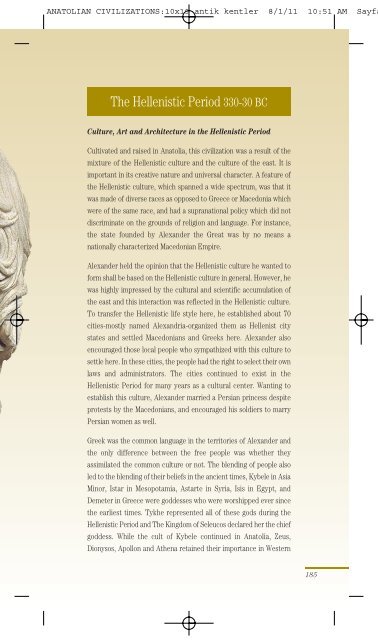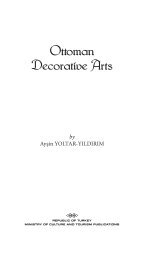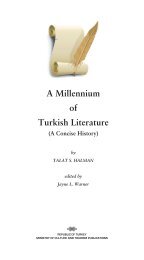Anatolian Civilizations and Historical Sites - TEDA
Anatolian Civilizations and Historical Sites - TEDA
Anatolian Civilizations and Historical Sites - TEDA
You also want an ePaper? Increase the reach of your titles
YUMPU automatically turns print PDFs into web optimized ePapers that Google loves.
ANATOLIAN CIVILIZATIONS:10x19 antik kentler 8/1/11 10:51 AM Sayfa<br />
The Hellenistic Period 330-30 BC<br />
Culture, Art <strong>and</strong> Architecture in the Hellenistic Period<br />
Cultivated <strong>and</strong> raised in Anatolia, this civilization was a result of the<br />
mixture of the Hellenistic culture <strong>and</strong> the culture of the east. It is<br />
important in its creative nature <strong>and</strong> universal character. A feature of<br />
the Hellenistic culture, which spanned a wide spectrum, was that it<br />
was made of diverse races as opposed to Greece or Macedonia which<br />
were of the same race, <strong>and</strong> had a supranational policy which did not<br />
discriminate on the grounds of religion <strong>and</strong> language. For instance,<br />
the state founded by Alex<strong>and</strong>er the Great was by no means a<br />
nationally characterized Macedonian Empire.<br />
Alex<strong>and</strong>er held the opinion that the Hellenistic culture he wanted to<br />
form shall be based on the Hellenistic culture in general. However, he<br />
was highly impressed by the cultural <strong>and</strong> scientific accumulation of<br />
the east <strong>and</strong> this interaction was reflected in the Hellenistic culture.<br />
To transfer the Hellenistic life style here, he established about 70<br />
cities-mostly named Alex<strong>and</strong>ria-organized them as Hellenist city<br />
states <strong>and</strong> settled Macedonians <strong>and</strong> Greeks here. Alex<strong>and</strong>er also<br />
encouraged those local people who sympathized with this culture to<br />
settle here. In these cities, the people had the right to select their own<br />
laws <strong>and</strong> administrators. The cities continued to exist in the<br />
Hellenistic Period for many years as a cultural center. Wanting to<br />
establish this culture, Alex<strong>and</strong>er married a Persian princess despite<br />
protests by the Macedonians, <strong>and</strong> encouraged his soldiers to marry<br />
Persian women as well.<br />
Greek was the common language in the territories of Alex<strong>and</strong>er <strong>and</strong><br />
the only difference between the free people was whether they<br />
assimilated the common culture or not. The blending of people also<br />
led to the blending of their beliefs in the ancient times, Kybele in Asia<br />
Minor, Istar in Mesopotamia, Astarte in Syria, Isis in Egypt, <strong>and</strong><br />
Demeter in Greece were goddesses who were worshipped ever since<br />
the earliest times. Tykhe represented all of these gods during the<br />
Hellenistic Period <strong>and</strong> The Kingdom of Seleucos declared her the chief<br />
goddess. While the cult of Kybele continued in Anatolia, Zeus,<br />
Dionysos, Apollon <strong>and</strong> Athena retained their importance in Western<br />
185






